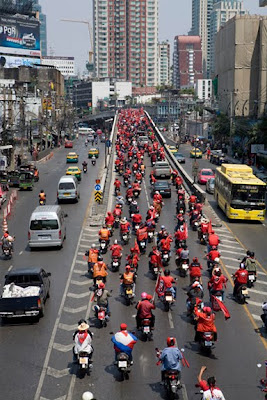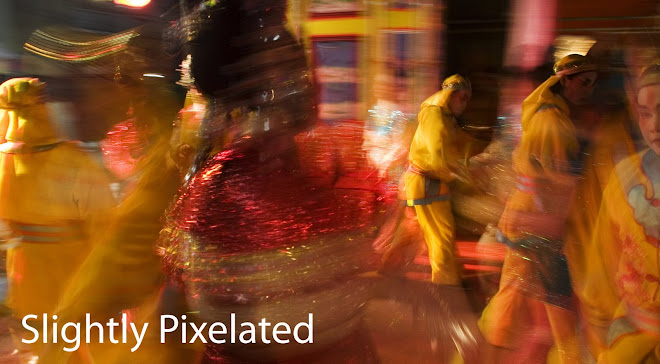
If Saturday was black, Monday was red.
Two days after the worst civil unrest here since the riots of May 1992, thousands of red shirts, some on motorcycles others crammed into pick-ups and trucks, paraded through the Thai capital forming an impromptu, sometimes chaotic, river of red that stretched for over 10 kilometers.
At times the procession took on the air of a victory parade with supporters lining the streets cheering and waving red flags. Some women watched with tears streaming down their faces as the protesters passed by, evidence of the deep emotions that have been unleashed by this crisis.
Coffins containing several of those killed in Saturday’s clashes were draped in Thai flags before being blessed by monks and hoisted onto the backs of open vehicles to serve as reminders of the cost of the red shirts’ defiance. A move calculated to inflame and harden sentiment among the red shirts whose mood was a volatile mix of euphoria and fury.
For the red shirts the good news just kept rolling in. Late in the afternoon they were bolstered by an announcement that the Electoral Commission had found the Democrat Party guilty of accepting an illegal donation of 258 million baht.
If the Constitutional Court, which must rule in such cases, confirms the commission’s findings, the Democrat Party will face dissolution and its leaders, including Prime Minister Aphisit, will be banned from politics for five years.
The Democrat Party would be the third to be dissolved in as many years, leaving Thailand’s political landscape, already in disarray, deprived of many of its principal players.
Probably the visible tip of behind-the-scenes political maneuvering, the Electoral Commission’s announcement dealt a fresh blow to the Prime Minister and his beleaguered coalition, which is running short of options as it struggles to put an end to the protests. The red shirts principal demands are that Parliament be dissolved and fresh elections called.
The army’s failure to dislodge the demonstrators on Saturday and the resulting loss of life make it difficult for Aphisit to send government troops back into the streets. Thai Army Chief General Anupong Paochinda seemed to underscore this when he announced, “the situation requires that the problem be solved by politics.”
But despite intense pressure, Aphisit has remained combative. In an afternoon press conference he reaffirmed his government’s unity and issued an ominous warning that terrorists seeking to bring about a ‘great change’ in Thailand had infiltrated the red shirt protest movement.
This was a coded nod to widespread rumours that the red shirts’ ultimate objective is to overthrow Thailand’s monarchy. The red shirt demonstrations have indeed been unique for the total absence of images of the King and Queen who are generally revered and have traditionally been used as icons to legitimize any form of popular protest.
Aphisit’s warning would seem to be an attempt to rally pro-royalist sentiment as a counterbalance to the momentum and popularity of the red shirts.
If the Prime Minister is seeking to characterize the current conflict as one between royalists and the enemies of Thailand’s much revered monarchy, it would also signal the opening of a dangerous new front in Thailand’s deepening crisis.
A perceived threat to the monarchy would almost certainly be met by an aggressive and probably violent response from royalists – most likely led by the ‘yellow shirts’ of the People’s Alliance for Democracy (PAD).
Many observers fear that the longer the crisis drags on there is a mounting risk that there could be a street-level backlash by supporters of the PAD, who led the movement that culminated in Thaksin Shinawatra’s ouster in 2006 and whose mainly privileged urban middle/upper class support base represents the opposite end of the political spectrum from the populist red shirts.
With the government looking cornered and with support for the red shirts running high in rural areas, the Democrat led coalition knows that if it dissolves parliament and holds fresh elections now its chances of being returned to power by a popular vote are slim.
By stirring divisive fears over the future of Thailand's monarchy, however, the government risks worsening the current conflict; creating a situation that could lead to more of the violence and instability that has already wrought considerable damage to Thailand's once gleaming economy.

No comments:
Post a Comment